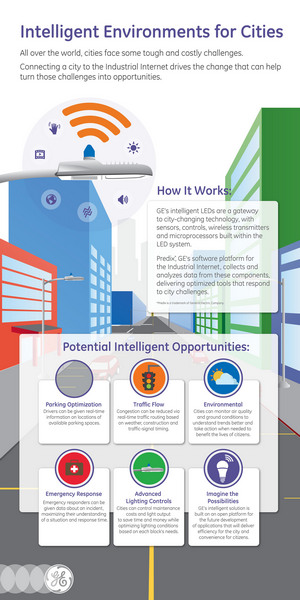Cities on both U.S. coasts will soon begin piloting new GE technology designed to help them become more intelligent and efficient. San Diego, California, and Jacksonville, Florida, will both be trialing a new GE LED solution, which uses LED street lighting installations to connect, collect and analyze data being generated, harnessing the power of the Industrial Internet to help their city run better while providing new services and conveniences for residents and visitors.
From high street lighting costs to traffic congestion, parking allotments and emergency response, cities across the world juggle a variety of challenges. GE is developing solutions that will help cities solve these problems through their existing infrastructure. By repurposing street lights with LEDs containing sensors, controls, wireless transmitters and microprocessors, a city will be able to create new opportunities for reducing cost, optimizing their operations and creating value-added services for residents, making their cities even more livable and workable.
 |
|
San Diego and Jacksonville to begin trials of the software-enabled lighting solution this spring, summer GE solution uses LED street lights to connect, collect and analyze data to harness the power of the Industrial Internet—optimizing operations and making new connections with residents and visitors GE's intelligent LEDs are a gateway to city-changing technology. (Graphic: General Electric) GE's intelligent LEDs are a gateway to city-changing technology. (GE/LEDinside) |
Driven by Predix*, GE’s innovative software platform that connects machines, data and people to help improve asset performance management, the intelligent-cities-enabling technology will provide a platform for the future development of intelligent applications that will deliver efficiency for the city and convenience for citizens.
“This solution truly presents endless possibilities for cities to learn, connect and improve both their operations and everyday life for their citizens,” says Maryrose Sylvester, president and CEO of GE Lighting. “In the pilots with San Diego and Jacksonville, we will be working with the cities to analyze data trends and determine where the solution holds the most value and how it will ultimately be used.”
The potential opportunities are truly endless, giving a city access to real-time data that never existed before.
For instance, parking downtown may be a pain, but not in the intelligent city of the future. Networked LED street lights will have the ability to direct drivers to available spaces with the help of built-in sensors and wireless transceivers. The same street light could serve as a sensor and give warnings in the event of a hurricane or other event through a public-address speaker concealed within the light post. In another scenario, microprocessors and other sensors could work together to give emergency responders real-time views of an area as they are responding to a 9-1-1 call, before they even arrive on the scene. These features are examples of what could be driven through this solution in the future.
Jacksonville Pilot
Jacksonville, the largest city in terms of area for the continental U.S., will trial the GE solution in the summer of 2015.
“Jacksonville is excited to be on the front lines with this pilot project, using new technology to increase efficiency and drive innovation, at no cost to taxpayers,” said Jacksonville Mayor Alvin Brown. “This is another example of how public-private partnerships can drive innovation and provide a return on investment for our taxpayers. This technology has the potential to transform how our city solves problems by allowing us to use the power of data to drive outcomes that give us flexibility, efficiency and new, creative actions to enhance life in our city.”
In addition to piloting the intelligent-city-enabling solution, the city will also pilot LightGrid™, a wireless controls technology, which will provide significant energy savings to the city. LightGrid allows for more efficient management of street lights. With remote monitoring and GPS mapping, municipalities are able to instantly identify usage and performance of street lights within specific locations.
The city of Jacksonville has utilized public-private partnerships under Mayor Brown to leverage public- and private-sector resources to improve the quality of life in Jacksonville. Past projects include redevelopment in the downtown area, collaborations to activate increased exporting and Downtown investment, and support for resiliency and emergency preparedness.
Read more about the Jacksonville announcement HERE.
San Diego Pilot
The first-in-the-nation pilot in San Diego adds sensor technology to existing GE smart LED street lights, with a focus on parking solutions in its urban core.
San Diego Mayor Kevin Faulconer said, “San Diego has proven that intelligent infrastructure saves energy and taxpayer dollars. We believe that this collaboration will help us go further in creating truly intelligent infrastructure that helps us improve services to the public.”
In 2014, San Diego became the first U.S. city to widely use GE’s LED lighting fixtures with LightGrid outdoor wireless controls technology. The technology, deployed on more than 3,000 city street lights, saves the city more than $350,000 annually in energy and maintenance costs.
Read more about the San Diego announcement HERE.












